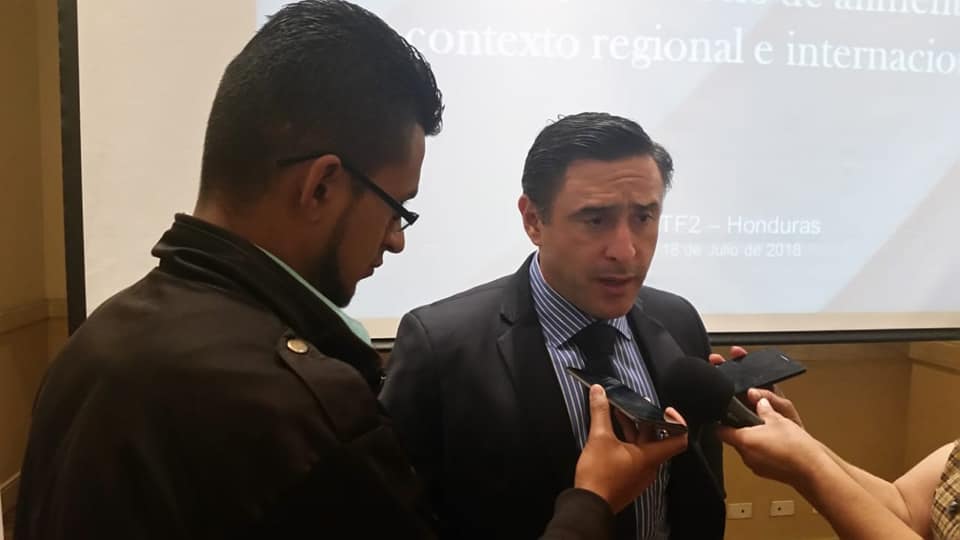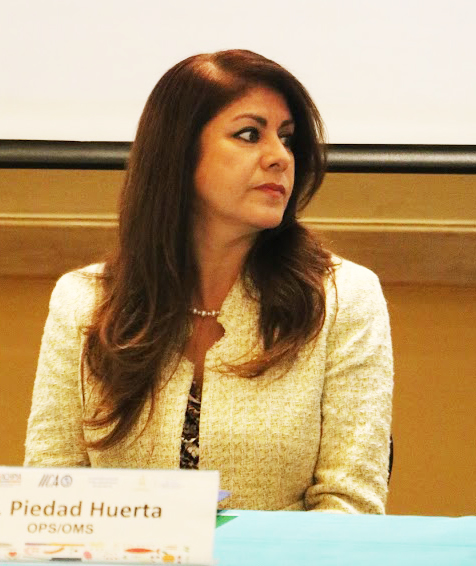Codex Trust Fund 2 project launched in Honduras
Honduran officials of the Ministry of Economic Development, the Ministry of Agriculture and Livestock, the Ministry of Health, the Agency for Health Regulation and the Honduran Organization of Normalization joined the national Codex Contact Point and others in Tegucigalpa to announce the start of a Codex Trust Fund 2 project. On 18-19 July two events were held to launch the efforts to strengthen food safety and international trade: a launch event complete with the signing of an inter-institutional Letter of Understanding for the Strengthening of National Codex Alimentarius Subcommittees and a technical workshop.

Héctor Ferreira, Ministry of Agriculture and Livestock
"We are very honoured, because of the 32 applications worldwide, Honduras was the only country in the Latin American region selected as beneficiary by the Codex Alimentarius Trust Fund, which is the result of the joint work of the different member institutions of the National Committee in preparing and presenting a robust proposal," said Héctor Ferreira, Ministry of Agriculture and Livestock, emphasizing that the active participation of all the institutions is key to a successful project and an international model.
Ricardo Paz, Director General of SENASA, said that the next three years will see many challenges, and Honduras is firmly committed to achieving the objectives set and implementing systematic measures to lay the foundations of a national Codex structure as well as establishing its sustainability. "We are aware that CTF2 in Honduras is a first achievement for the country and its implementation entails great responsibility to respond to global expectations," Paz said.

Piedad Huerta (left), Representative of Pan American Health Organization (PAHO) in Honduras, highlighted in her keynote speech the importance of the Codex Alimentarius, the national commitments that must be made for the successful implementation of the CTF2 project, as well as other public health issues, such as the actions necessary in the country to combat antimicrobial resistance.
After the launch, a technical workshop was held in which experts from the Codex Alimentarius Office of the United States, the Chilean Agency for Food Safety and Quality (ACHIPIA) of Chile, PAHO and the Institute Inter-American Cooperation for Agriculture (IICA) shared their experiences in working with Codex standards and promoting food safety.
Among the issues addressed was the coordination and minimum conditions necessary among the public sector, private sector, academia and consumers for an adequate structure and management, as well as the importance of science in developing food regulations.
Read more http://senasa.gob.hn/
At the heart of the Codex mandate are the core values of collaboration, inclusiveness, consensus building and transparency. Governmental and non-governmental, public and private organizations alike play a vital role in ensuring Codex texts are of the highest quality and based on sound science.
Codex would have little authority in the field of international standard setting if it did not welcome and acknowledge the valuable contributions made by observers. Expert technical bodies, industry and consumer associations
contribute to the standard-setting process in a spirit of openness, collaboration and transparency.
Intergovernmental organizations (IGOs) and international non-governmental organizations (NGOs) can apply for observer status in Codex in order to attend and put forward their views at every stage of the standard-setting process.
 Current Codex Alimentarius Commission
Current Codex Alimentarius Commission
Codex Trust Fund 2 project launched in Honduras
Honduran officials of the Ministry of Economic Development, the Ministry of Agriculture and Livestock, the Ministry of Health, the Agency for Health Regulation and the Honduran Organization of Normalization joined the national Codex Contact Point and others in Tegucigalpa to announce the start of a Codex Trust Fund 2 project. On 18-19 July two events were held to launch the efforts to strengthen food safety and international trade: a launch event complete with the signing of an inter-institutional Letter of Understanding for the Strengthening of National Codex Alimentarius Subcommittees and a technical workshop.

Héctor Ferreira, Ministry of Agriculture and Livestock
"We are very honoured, because of the 32 applications worldwide, Honduras was the only country in the Latin American region selected as beneficiary by the Codex Alimentarius Trust Fund, which is the result of the joint work of the different member institutions of the National Committee in preparing and presenting a robust proposal," said Héctor Ferreira, Ministry of Agriculture and Livestock, emphasizing that the active participation of all the institutions is key to a successful project and an international model.
Ricardo Paz, Director General of SENASA, said that the next three years will see many challenges, and Honduras is firmly committed to achieving the objectives set and implementing systematic measures to lay the foundations of a national Codex structure as well as establishing its sustainability. "We are aware that CTF2 in Honduras is a first achievement for the country and its implementation entails great responsibility to respond to global expectations," Paz said.

Piedad Huerta (left), Representative of Pan American Health Organization (PAHO) in Honduras, highlighted in her keynote speech the importance of the Codex Alimentarius, the national commitments that must be made for the successful implementation of the CTF2 project, as well as other public health issues, such as the actions necessary in the country to combat antimicrobial resistance.
After the launch, a technical workshop was held in which experts from the Codex Alimentarius Office of the United States, the Chilean Agency for Food Safety and Quality (ACHIPIA) of Chile, PAHO and the Institute Inter-American Cooperation for Agriculture (IICA) shared their experiences in working with Codex standards and promoting food safety.
Among the issues addressed was the coordination and minimum conditions necessary among the public sector, private sector, academia and consumers for an adequate structure and management, as well as the importance of science in developing food regulations.
Read more http://senasa.gob.hn/
 Codex and Observer
Codex and Observer
around the world since ancient times.
We might not always know where it comes from,
but we expect it to be available, safe and of good quality.









Leave a comment